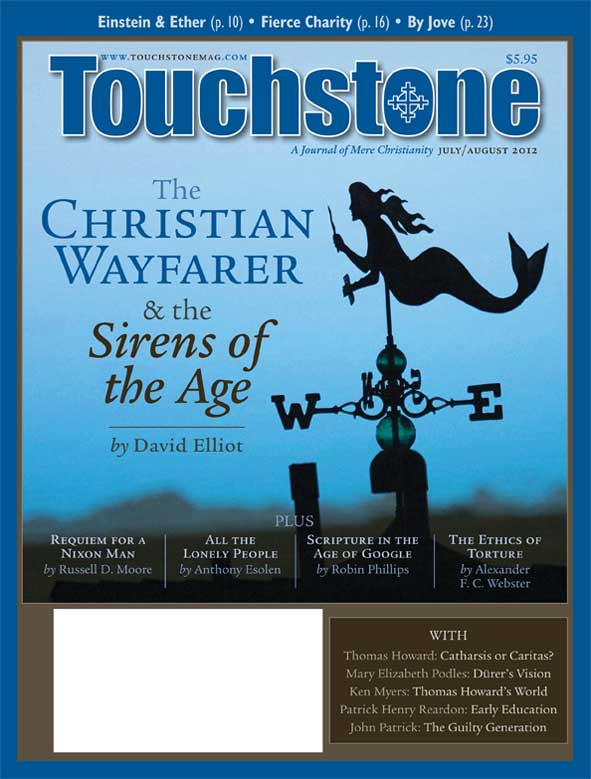View
Fierce Charity
S. M. Hutchens on the Christian's Duty to Be Strictly Loving
There is a long line of Christian teaching that arrays itself against wickedness which demands that true charity prove itself by doing evil no harm, granting love the intolerance it requires to manifest itself as love. In the train of the One who plied a scourge in the Temple, St. Augustine observed in his Seventh Homily on the Epistle of St. John,
. . . we find a man by charity made fierce and by iniquity made winningly gentle. A father beats a boy and a boy-stealer caresses. If you name the two things, blows and caresses, who would not choose the caresses and decline the blows? If you mark the persons, it is charity that beats, iniquity that caresses. . . . Love, and do what you will. (§8)
I fear that the stock of neither Augustine nor his Master, nor those who follow them, is high in places where love, and harmlessness in the face of lies and error, are confounded. Again and again one reads with speechless frustration the kind of thing found in Hubert Edgar's July 27, 2011 admonition in a posting titled "Beautiful Disharmony" at the blogsite of Christians for Biblical Equality:
Egalitarianism is not a salvific doctrine. What we're arguing is in-house—not believer vs. unbeliever. A loving complementarian relationship or situation can be very godly if all involved are agreed and trying to imitate Christ. I believe there is a more excellent way, that of egalitarianism. The problem between the two really arises most clearly when one of two things are [sic] happening: A gifted and called person is not allowed to serve God in the church because of their race/gender/social status or a marriage is in trouble because of misuse/misunderstanding of authority issues.
In these two situations, it is vital that we interact with each other with love and respect. Hopefully, we will have mutual respect. We must work to get our emotions under control, specifically under the Holy Spirit's control. God will help us do this. While conversations between egalitarians and complementarians often bring to light vital or volatile disagreements, we do not have to agree in order to love one another, and to disagree in a godly way, we must do so lovingly.
Even if we leave aside the many torsions in this passage (e.g., the implications of "Egalitarianism is not a salvific doctrine" or that race and gender are equivalent species in the matter of gifts and calls), we are still left with the confusing juxtaposition of concepts that require an emphatic Yes on one hand and an equally emphatic No on the other, particularly those that require a definition of what "lovingly" means.
It is plain that to many egalitarians "love" regularly means: "Allow us to stay where we are, in church, school, and elsewhere, and reward us to teach our doctrine to you, your children, and your pastors. Do not denounce us as errorists or heretics, or say our teachings are non-Christian, or that we are not Christians so far as we are egalitarians, for this cannot be done in Christian love. Do not censure or silence us in your parliamentary gatherings. Let us have voice and vote; place no special termini on our privilege of addressing them, no matter how many times our proposals are rejected. Give us the chance to wear them down. While we're doing these things, treat us with respect: condemning our teachings is, for sinners like you, condemning our persons. Do not lose your tempers when we persist in promulgating our beliefs against your repeated objections. You cannot be angry at us and sin not."
Love Requires Correction
The Yes on which we agree (at least superficially) is that all must be done according to love; the No applies where love is presented as benign toleration of error, which toleration works to the slow destruction of our consciences. For those responsible for leading and teaching in the churches, love in such situations will involve, as St. Augustine noted, what is necessary for correction.
First, there must be public rebuke for the public teaching of the egalitarians and other heretics, rebuke based upon the conviction that their doctrine is schismatic and does damage to the Body of Christ, and that their own invariable charge of schism toward us is -effrontery, blaming us for the wounds they have themselves inflicted with novel teachings that divide the church where once there was no division.
The second charge of love is naming and refuting the error, not just as a disagreement in an association of imperfect human beings where no pot can be right enough to call a kettle black, but positively and explicitly, so that the humility involved in owning one's own sin does not blunt the edge of the attack on error. We are not bound by patience, deference, humility, kindness, or the knowledge of our faults and finitude to be silent about, or unobtrusive to, false teaching.
Finally, love ineluctably involves studied separation from error to a degree appropriate to the nature and amplitude of the offense. While, for example, I would join a woman who believed herself to be a Christian presbyter in the care of the sick or poor, and would happily be a good neighbor to her, I would not as a rule attend any church service at which she was preaching or handling the sacraments, nor would I belong to the denomination that ordained her. Being raised among fundamentalists who exercised much poor judgment in "biblical separation," I still think their understanding that the Scriptures demand hard and decisive discrimination on such matters is entirely correct. Good Catholics have the same kind of scruples—and very rightly so—about sharing the Lord's Table with the likes of me.
As long as love can be understood as bearing these features, by all means let us exercise it vigorously. But I am far from sure that many of those who raise a pious monitory finger, advising us to exercise this and other virtues in their favor for Christ's sake, aren't really demanding that we let the wolves enjoy their dinners undisturbed.
S. M. Hutchens is a senior editor and longtime writer for Touchstone.
subscription options
Order
Print/Online Subscription

Get six issues (one year) of Touchstone PLUS full online access including pdf downloads for only $39.95. That's only $3.34 per month!
Order
Online Only
Subscription

Get a one-year full-access subscription to the Touchstone online archives for only $19.95. That's only $1.66 per month!
bulk subscriptions
Order Touchstone subscriptions in bulk and save $10 per sub! Each subscription includes 6 issues of Touchstone plus full online access to touchstonemag.com—including archives, videos, and pdf downloads of recent issues for only $29.95 each! Great for churches or study groups.
Transactions will be processed on a secure server.
more on christianity from the online archives
more from the online archives
calling all readers
Please Donate
"There are magazines worth reading but few worth saving . . . Touchstone is just such a magazine."
—Alice von Hildebrand
"Here we do not concede one square millimeter of territory to falsehood, folly, contemporary sentimentality, or fashion. We speak the truth, and let God be our judge. . . . Touchstone is the one committedly Christian conservative journal."
—Anthony Esolen, Touchstone senior editor












